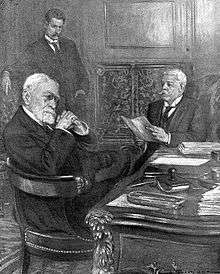Wilhelm von Schoen
Not to be confused with: Hans von Schoen
.jpg)

Wilhelm Eduard Freiherr von Schoen (Schön) (June 3, 1851 in Worms – April 24, 1933 in Berchtesgaden) was a German diplomat. He was especially known as German ambassador in Paris at the beginning of World War I and as State Secretary for Foreign Affairs of the German Empire.
As one of Germany's leading diplomats he was appointed as Ambassador to France. He recommended that any ultimatum to Serbia was supported in Vienna by the 'localization' of any possible conflict in the Balkans. Whilst Germany was determined to maintain the Teutonic Central Powers alliance at all costs, they did not want an all out war. The assurance that Britain would stand by Russia and France, however lent real fear to German foreign policy that Russian policy in the Balkans would immediately force to aid Serbia. Schoen ensconced in the sophisticated capital of Paris sent a telegram of 26 June announcing to Berlin that France was ready to negotiate. Bi-lateral talks would bring the two blocks together in peace. But by 1 August the French were standing pat with the response they would secure the "National Interest." Schoen could not face passing on the blackmail demand that France stay neutral in Germany's planned conflict. Schoen knew he had failed when the trend in assassinations spread to Paris. In the first week of August frantic efforts were made to stop the war at the Quai d'Orsay which he visited 11 times in 7 days. Poincare had worked for appeasement or peace, but Schoen knew the Entente powers would not split, "My question is rather naive, for we know you have a treaty of alliance", he demurred.
Von Schoen was naturally sympathetic. He could speak several languages, as ll the German diplomatic corps, including french. His wife was a Belgian. He was distressed when he met Premier Rene Viviani by the news that the Americans were to take his embassy. Made worse by the fear of failure was the ultimatum he carried. Their solemn parting epitomised the reluctance to go to "a war to end all wars". He immediately returned to Berlin.
Notes
- Der Nationalismus im Leben der Dritten Republik, Berlin 1920. (Mitautor)
- Erlebtes: Beiträge zur politischen Geschichte der neuesten Zeit, Stuttgart 1921.
- The Memoirs of An Ambassador. A Contribution to the Political History of Modern Times, London 1922,
- Mémoires (1900-1914), Paris 1922.
- Deutschland und die Schuldfrage, Berlin 1924.
- Kleiner Führer durch das Berchtesgadener Land, Berchtesgaden 1925.
- The German Declaration of War on France: The Question of Telegram Mutilations. Premier Poincaré versus Ambassador von Schoen, USA 1927.
External links
- Works by or about Wilhelm von Schoen at Internet Archive
- Biographie im Nordisk Familijebok von 1916 (Swedish)
- Wilhelm von Schoen in the German National Library catalogue